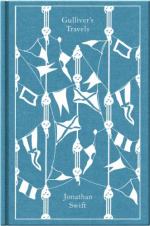|
|
Gulliver's Travels Topic Tracking: Politics
Politics 1: When Gulliver first meets the emperor of Lilliput, he is honored. He wants to impress this man who runs the country so well. Gulliver discovers the mathematics involved with the country and how intelligent these people are. Furthermore, he politically plays his cards right, as he demonstrates kindness and clemency with the Lilliputians. By putting them down, instead of eating them, Gulliver politically showed the population his generosity and kindness.
Politics 2: Gulliver requests his freedom from the Emperor of Lilliput, however, is turned down. The Emperor, however, uses Gulliver for his own political gain. Gulliver allows the Lilliputian army to march through his legs. Furthermore, the Emperor orders an edict about Gulliver that would eventually grant him his freedom. It is a long and complicated list of orders and mandates.
Politics 3: When Gulliver learns about the opposing political forces in Lilliput, he sees the futility in their arguments. The parties are in opposition because of a feud on how to break an egg; either by its big end or small end. Because of such a feud, the Big-Endians must flee and find refuge in the neighboring enemy island of Blefuscu.
Politics 4: Gulliver helps the Lilliputian army by pulling out the anchor of a Blefuscu ship and carrying it to victory for Lilliput. Upon such a victory, the Emperor makes Gulliver a Nardac, a position of superior honor, and praises him for his political edge. However, Gulliver soon commits political suicide by expressing his values and virtues. He refuses to enslave the Blefuscu island. He helped Lilliput win, but he will not harm Blefuscu. This statement causes further political problems for Gulliver during his stay on Lilliput.
Politics 5: Gulliver learns of the different political system of Lilliput. The good is rewarded, as opposed to not simply the bad being punished. Children are raised outside of the family in nurseries, there is no Divine Providence, and ingratitude is a capital crime. Gulliver takes note of such staunch differences in the political culture of Lilliput from England.
Politics 6: Reldresal informs Gulliver of the threat on his life. The Emperor and assemblymen have voted to have Gulliver killed because of his actions as a traitor, of public urination, of refusing to obey the Emperor's command, and so on and so forth. Because of such political problems, Gulliver is forced to flee Lilliput to Blefuscu.
Politics 7: Gulliver describes the political system of England to the King of Brobdingnag. After a while, the King jokes with Gulliver about the differences between Whigs and Tories.
Politics 8: Gulliver explains more of the political system of the United Kingdom to the King of Brobdingnag. This time, the discussion continues for days and in front of several more people. The king wants Gulliver to have an audience, so he brings in some of his royal friends to listen. They do not understand Gulliver's system of politics, and offer rebuttals to each law cited.
Politics 9: Gulliver learns of the problems with the continent lands and of the method of controlling them. There are three ways by which Laputan politics and governance control the land, in order of gravity. First, they throw stones and rocks on the land, forcing people to flee into caves. Second, they cover the continent with Laputa, preventing lightness and rain from entering the land. And finally, they smash Laputa on top of the land, causing complete disaster. The latter is never used.
Politics 10: Munodi explains the political problems that he has with the people of Balnibarbi. After the revolt in Lindalino, they people established an Academy, full of impractical and ridiculous experiments. The people of the land are frustrated with Munodi for not helping the problems with agriculture and food. Therefore, Munodi must not show his face at the Academy.
Politics 11: Gulliver learns of the laws pertaining to the Struldbruggs of Luggnagg. They do not favor these people and mandate certain actions be taken against them when they reach a certain age. When Gulliver decides to bring back some of these Struldbruggs to England, the laws of transport do not allow it.
Politics 12: Gulliver explains a bit of English politics to his master when he explains the differences between horses and humans. Humans (or yahoos) control the horses (or Houyhnhnms), chaining them, raising them, using them, and even castrating them. This differential nature shocks and confuses Gulliver's master horse.
Politics 13: Gulliver begins to explore the differences in politics between England and Houyhnhnm, beginning with the rule by reason. Everything is done differently in this land, and much to Gulliver's pleasing. The master doesn't understand lawyers or laws or politics or parliament or any of the core values by which England (and thenceforth Europe) is run.
Politics 14: Gulliver is forced to leave Houyhnhnm after the Assembly voted him to leave. They had been discussing the political expulsion and extermination of all yahoos from the land. After his master speaks in his favor, the Assembly of Houyhnhnms still votes that Gulliver must leave the land because of his close association and likeliness of the yahoos.




